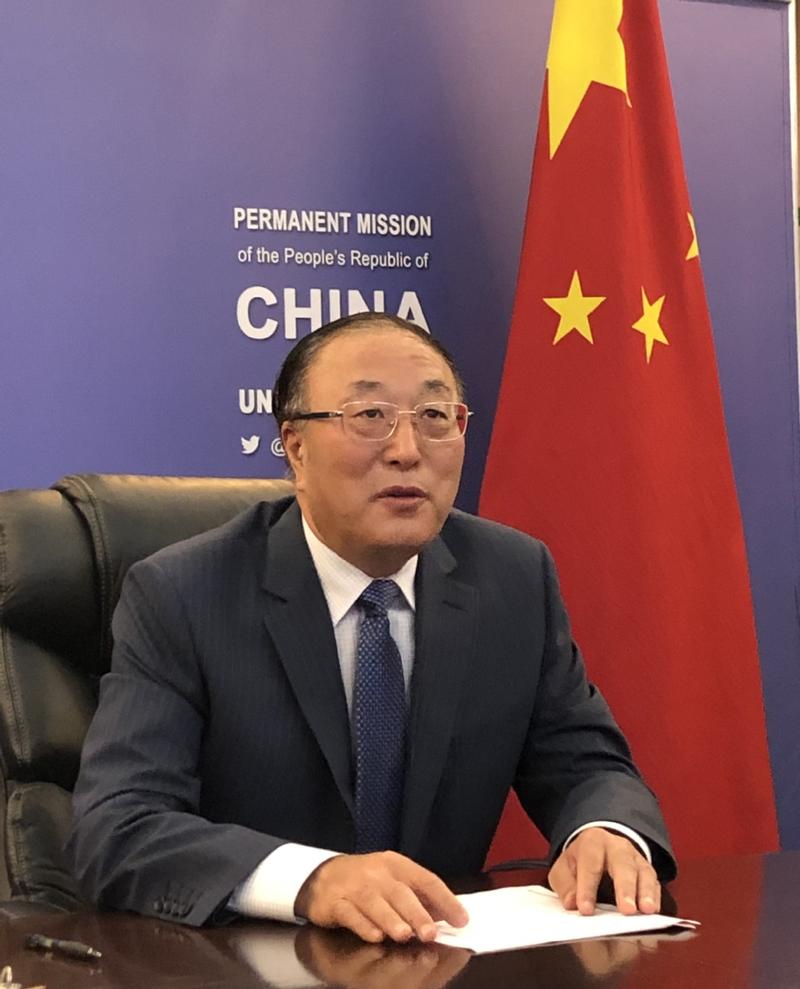 Zhang Jun, China's Permanent Representative to the UN, speaks in a virtual webinar on June 3, 2021. (PHOTO / FMPRC.GOV.CN)
Zhang Jun, China's Permanent Representative to the UN, speaks in a virtual webinar on June 3, 2021. (PHOTO / FMPRC.GOV.CN)
China's Permanent Representative to the UN, Zhang Jun, says unilateral coercive measures are "turning a health crisis into a moral crisis".
In a virtual webinar on Thursday, Zhang said the pandemic is far from over, amid surging new cases, more contagious variants and a widening vaccine divide. However, "at this critical juncture", measures imposed by some countries are "undermining global response and threatening the health of people of targeted countries", he said.
Unilateral coercive measures "are illegal, unjustified and unreasonable", Zhang said. While the pandemic is natural, such measures "are man-made and turning a health crisis into a moral crisis".
No state shall apply domestic law to exercise long-arm jurisdiction over other countries. Such practices seriously violate the purposes and principles of the UN Charter, the fundamental principle of sovereign equality in international law and the basic principle of noninterference in international relations.
Zhang Jun, China's Permanent Representative to the UN
The virtual webinar was on "the impact of unilateral coercive measures on national health systems of targeted developing countries", which China co-hosted with the permanent missions of Belarus, Bolivia, Cuba, Iran, Nicaragua, Russia, Syria, Venezuela and Zimbabwe.
Zhang said such measures violate international law. The UN Charter stipulates that states have a duty "to practice tolerance and live together in peace with one another as good neighbors", he said.
"No state shall apply domestic law to exercise long-arm jurisdiction over other countries. Such practices seriously violate the purposes and principles of the UN Charter, the fundamental principle of sovereign equality in international law and the basic principle of noninterference in international relations."
ALSO READ: UN envoy: Multilateralism crucial
Some countries are using unilateral sanctions to suppress governments of other states and incite "color revolution" and regime change, he said, and some use unilateral coercive measures as "their tool for unfair economic and scientific competitions".
Such measures produce a human rights crisis, Zhang said. According to UN reports, no "high values" could justify the violation of fundamental human rights, including the right to life, the right to health and the right to food, he said. COVID-19 shows clearly that unilateral coercive measures can be deadly for vulnerable people, he said.
Such measures worsen humanitarian crises, he said. The UN secretary-general and the high commissioner for human rights have repeatedly called for the lifting of unilateral sanctions to meet humanitarian needs. In reality, humanitarian assistance and trade in goods, such as medical equipment and parts, software, drug and food, is constantly interrupted or restricted, Zhang said.
READ MORE: Chinese UN ambassador pays tribute to peacekeepers
The UN General Assembly has adopted resolutions against "unilateral economic measures as a means of political and economic coercion against developing countries" every two years since 1989, he said, on the "necessity of ending the economic, commercial and financial embargo imposed by the US against Cuba "each year since 1992, and on "human rights and unilateral coercive measures" each year since 1997.


